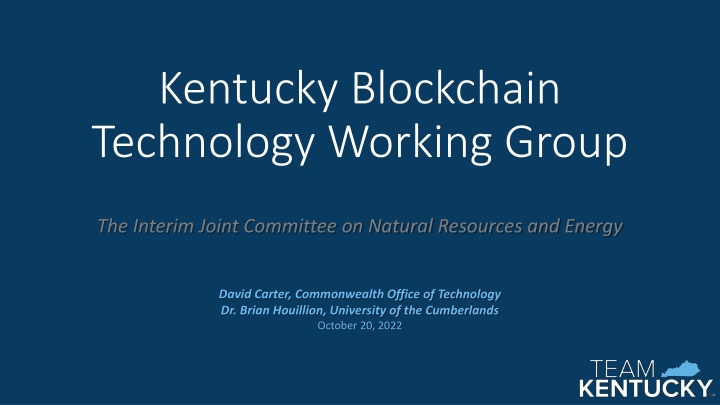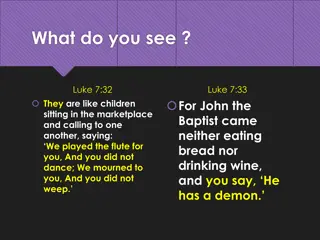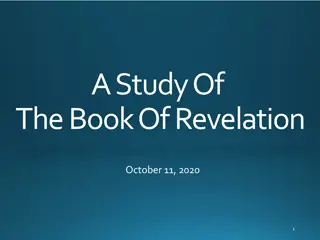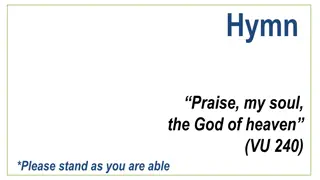Seeking God's Presence Amidst Challenges
Embrace the profound message of God's presence through powerful verses from the scriptures. Reflect on the importance of maintaining a connection with the divine in a changing world full of distractions. Find solace in the promise of God's unwavering presence in both times of joy and hardship.
Download Presentation

Please find below an Image/Link to download the presentation.
The content on the website is provided AS IS for your information and personal use only. It may not be sold, licensed, or shared on other websites without obtaining consent from the author.If you encounter any issues during the download, it is possible that the publisher has removed the file from their server.
You are allowed to download the files provided on this website for personal or commercial use, subject to the condition that they are used lawfully. All files are the property of their respective owners.
The content on the website is provided AS IS for your information and personal use only. It may not be sold, licensed, or shared on other websites without obtaining consent from the author.
E N D
Presentation Transcript
Kentucky Blockchain Technology Working Group The Interim Joint Committee on Natural Resources and Energy David Carter, Commonwealth Office of Technology Dr. Brian Houillion, University of the Cumberlands October 20, 2022
Working Group Overview Nine (9) statutory members defined in KRS 42.747 & subject matter experts proposed and voted on by the core team. This year we have added advisory representation from Bluegrass Blockchain, a local organization focused on local opportunities for Blockchain in business and academia. Open meetings are held monthly through the state virtual collaboration platform and are open to the public. Report to be submitted annually on December 1st of each year.
Working Group Mission Statement The mission of the Kentucky Blockchain Technology Working Group is to evaluate the feasibility and efficacy of using blockchain technology to enhance the Commonwealth by identifying opportunities for the adoption, utilization, and/or regulation of blockchain technology.
What is Blockchain Technology Blockchain is an encrypted, secure distributed ledger (decentralized database) system that maintains a digital record of transactions. Individual records, called blocks, are linked together in a single list, called a chain. Blockchain is a scalable technology used for recording transactions made with cryptocurrencies, such as Bitcoin, and it has many other applications such as supply chain and logistics monitoring, data sharing, digital voting, real estate and auto title transfer tracking, equities and energy trading, and much more.
2021 Report Highlights The 2021 report provided insights into use cases spanning a number of sectors to include: Finance Records Management Public Utilities Logistics and Supply Chain Management Healthcare
2021 Report Highlights - Finance The world of finance is entirely transaction driven. This is the ideal environment for blockchain to have a positive impact. Highly transactional based systems have the highest level of benefit from blockchain and align with the core design and principles of blockchain. This enhances conducting transactions across or in financial institutions, and other sectors involved in commerce, with the highest level of security. Explore the benefits of creating a new cryptocurrency for Kentucky. Pursue legislation creating charters for special purpose depository institutions. The Working Group should continue monitor the ongoing development of alternative currency. Explore the use of blockchain based municipal bonds to fund future projects. The Blockchain Technology Working Group should continue to define the risks and opportunities of Decentralized Finance for Kentucky. A comprehensive investigation of the legislative amendments needed to fully recognize and account for digital assets, tokenization of assets, and digital securities is needed. Adopt the ULC drafted proposal changes early with the anticipation that this is the path that most states will follow in the future.
Case Study Wave Financial Wave Financial launched the Kentucky Whiskey 2020 Digital Fund to capitalize on interest in whiskey as a collectible asset. It acquired the output of 2,700 barrels of whiskey being produced by Danville, Kentucky-based Wilderness Trail. Wave s Real Asset fund is providing the capital to help Wilderness produce and then age the barrels of whiskey for an expected six (6) years. The fund will be tokenized to a create a secondary market to allow liquidity of investment to initial fund participants. Wave Financial provides both asset management and wealth advisory services, marrying traditional investment classes with an expertise in modern digital currencies and non-fungible tokens (NFTs). The firm was founded in 2018 and already manages more than $1 billion in crypto-based assets.
2021 Report Highlights Records Management The security and integrity aspects of blockchain technology are well suited for various areas of records management. From the execution of legal contracts and agreement to professional and occupational licensing, the ability to protect, track, and validate these documents with tremendous levels of auditing and accountability through the use of blockchain technology makes this sector another ideal candidate. The Kentucky Auditor s Office should explore the benefits of implementing blockchain technology in their auditing processes, especially those that occur annually. Amend legislation to include a member of the Blockchain Technology Working Group on the Task Force on Electronic Recording of Official Documents by County Clerks. The Kentucky Secretary of State, as custodian of both elections and business filings, should research the benefits of blockchain in the issuance and/or management of these records. The Commonwealth of Kentucky should continue to research opportunities that may benefit from blockchain technology in records and document management systems in the state government. The Department for Professional Licensing, the Public Protection Cabinet (PPC) and the Commonwealth Office of Technology (COT) should research the opportunity provided by incorporating blockchain technology into Kentucky s licensing systems.
2021 Report Highlights Public Utilities Public utilities such as water and power are the backbone of modern society and represent a sector that is at the very heart of critical infrastructure. The model for the delivery of these services continues to grow in complexity and relies increasingly on geographically diverse and disparate technology. Through the efficiency and security gains available with the integration of blockchain technologies, the delivery and protection of these critical services can be greatly enhanced.
Case Study - IoT, Autonomous Agents, & Smart Contracts The 2021 report included insights from an article by Don and Alex Tapscott published in Fortune Magazine. This article highlights the ability in the future for utility companies to leverage multipoint network, known as mesh networks, to speed restoration of services when there is a failure. By making parts of the utility infrastructure smart and able to communicate with each other, faults can be quickly pin pointed and restoration activities automatically triggered. This would utilize devices that actively monitor the various points throughout the infrastructure and communicate over a blockchain empowered network to get the vital information back to the utility provider. This adds layers of trust and security that are only possible through technologies such as blockchain. Reference: https://fortune.com/2016/05/15/blockchain-reinvents-power-grid/
2021 Report Highlights Logistics The Commonwealth is well positioned centrally to serve as a logistics center for the eastern united states making this a highly intriguing use case is the state and a potential draw for businesses within this sector. Modern logistics requires the close collaboration of suppliers, shippers, and receivers makings effective cross communication a vital need to ensure success. Through blockchain technology, these workflows and communications paths can be streamlined with enhanced integrity to ensure smooth operations.
2021 Report Highlights Healthcare The Commonwealth is already home to some of the most progressive and leading healthcare providers and research entities on the country. The need to share data among facilities and providers is key to facilitate effective and responsive treatment. In addition, as the nation works through the impacts of a global pandemic, the need to actively share data on a large scale for trending and research is more apparent than ever. Blockchain can serve as a empowering foundation for these use cases. The Commonwealth of Kentucky should explore blockchain related grant and/or partnership opportunities with federal entities such as the Centers for Disease Control. The Commonwealth should poll neighboring states to determine if sufficient appetite exists to work towards efforts that use the security and efficiency of Blockchain technology to enhance, or implement new, mechanisms to share controlled substance information to contribute to the national fight against substance abuse.
2021 Report Highlights Other Recommendations Review the legislation to expand the role and mission of the Blockchain Working Group to encompass a broader field of view. Kentucky should explore the benefits of creating a state blockchain leadership position (officer, liaison, coordinator, etc.) to aid in the research and management of potential implementation of blockchain in the state government. Kentucky should review the legislation adopted or enacted in other states.
2022 Report Highlights - States Tennessee Treasurer s Office RFP Unclaimed Property/Digital Assets Florida Department of Financial Regulation Blockchain Advisor (Budget $500,000) South Carolina Treasurer s Office - $500,000 Blockchain Technology Education Office Virginia Banking Legislation Catawba Tribal Nation (SC) Created toe Catawba Digital Economic Zone Quasi-state government build on and for Blockchain/Web 3.0
2022 Report Highlights Federal Government Legislation H.R. 3639 Blockchain Innovation Act H.R. Blockchain Regulatory Certainty Act S. 4109 National R&D Strategy for Distributed Ledger Technology S. 4356 Responsible Financial Innovation Act (RFIA or Lummis Gillibrand Crypto Bill) ULC Emerging Technology Amendments approved for state promulgation 2022 SB 67 Banking OCC Interpretive Letter 1179 (Dec 2021) NCUA KY Parity Laws SEC/CFTC Regulatory Dispute/Regulatory Action
2022 Report Highlights Potential Recommendations Legislation Expanded scope of KBTWG Amend Membership of KBTWG UCC Emerging Technology Banking/Financial Institutions Funding Proactive/agile Working Group State advisor office and/or Working Group Administrator Educational opportunities/elected officials Comprehensive statute/regulation review Identify opportunities for development/adoption Efficiency/integrity/transparency
Thank you! Questions?























